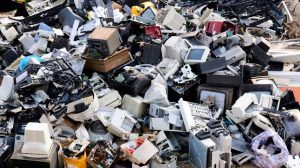
5 Steps to Build an Effective CSR Strategy
In today’s business landscape, Corporate Social Responsibility (CSR) has evolved from being a “nice-to-have” to ...

The Nigerian Government, the Global Environment Facility and United Nations Environment have spearheaded a 15-million-dollar initiative to launch a circular electronics system in Nigeria.
Up to 100,000 people work in the informal electronic waste sector in Nigeria, processing half a million tons of discarded appliances every year.
The initiative is aiming to reform the electronics sector and put an end to the toxic toll improper management of electronic waste is taking on Nigeria.
Over half a million tons of discarded appliances are processed in the country every year, threatening both the health of people in the informal recycling industry and the nation’s environment.
With backing from the Global Environment Facility, the Government of Nigeria has joined forces with UN Environment and partners to turn the tide on e-waste, under the Circular Economy Approaches for the Electronics Sector in Nigeria project. Led by the National Environmental Standards and Regulations Enforcement Agency (NESREA), the initiative will bring together players from government, the private sector and civil society to kickstart a financially self-sustaining circular economy approach for electronics in Nigeria, protecting the environment while creating safe employment for thousands of Nigerians.
Speaking at the launch of the program, Permanent Secretary of the Ministry of the Environment Mrs. Ibukun Odusote said e-waste posed a grave danger to both the environment and human health in Nigeria.
“This intervention by Global Environment Facility aims to stimulate the development of a sustainable circular economy for electronic products in Nigeria,” Odusote said, noting that the project would also support the E-waste Producers Responsibility Organization (EPRON) – a key initiative of the Government of Nigeria to promote sustainable production and consumption by encouraging producers to take responsibility for the entire lifecycle of their products.
Nigeria’s piles of e-waste come both from home and abroad. The country generated 290,000 tons of electronic waste in 2017 – a 170% increase against 2009. Meanwhile, Nigeria remains a major recipient of used electronics from abroad. While the true amount of overseas-generated waste landing in Nigeria is hard to quantify, United Nations University research has revealed more than 60,000 tons of used electrical and electronics equipment are shipped into the country annually via Lagos ports alone, with an unknown amount imported over land routes from neighboring countries. More than 25 percent of this is dead on arrival – heading straight to dumps or dismantling.
According to the International Labor Organization, up to 100,000 people work in the informal e-waste recycling sector in Nigeria, collecting and dismantling electronics by hand to reclaim the saleable components. Informal workers are directly exposed to hazardous chemicals and commonly suffer respiratory and dermatological problems, eye infections and lower than average life expectancy.
The waste with no economic value is often dumped or burned –releasing pollutants including heavy metals and toxic chemicals (including dioxins, furans and flame retardants), into the air, water and soil. Over 52,000 tons of brominated (flame retardant) plastics, 4,000 tons of lead, 80 tons of cadmium and 0.3 tons of mercury are burned or dumped in Nigeria every year.
But while e-waste is a threat – it is also an opportunity. With 100 times more gold in a ton of e-waste than in a ton of gold ore, alongside other scarce and valuable materials such as platinum, cobalt and rare earth elements, a safe and efficient recycling industry has the potential to be a big business.
“The environmental and economic benefits of a circular economy are clear,” said Inger Andersen, UN Environment Executive Director. “This innovative partnership with the Government of Nigeria and the Global Environment Facility is a positive step in the country’s efforts to kickstart a circular electronics system, and one that UN Environment is proud to support.”
The Circular Economy Approaches for the Electronics Sector in Nigeria project will support the implementation of Extended Producer Responsibility legislation, working with the private sector to develop cost-effective value retention businesses, including recycling and disposal systems for electronic products, while ensuring that informal workers in the sector, such as e-waste collectors and recyclers, have opportunities to improve their livelihoods, working conditions, and their health and safety.
Along with promoting recycling of usable components of electronic products, the project will develop systems for the disposal of non-usable and toxic waste, and aims to collect, treat and dispose of more than 270 tons of e-waste contaminated with persistent organic pollutants and 30 tons of mercury-containing waste.
The project also aims to have an impact beyond Nigeria through the development of a practical circular electronics model for Africa and beyond, by sharing best practices, promoting regional and global dialogue, and engaging global manufacturers.
Circular Economy Approaches for the Electronics Sector is the first demonstration project in the electronics sector convened by the World Economic Forum under the Platform for Accelerating the Circular Economy (PACE), a public-private collaboration mechanism and project accelerator dedicated to bringing about the circular economy at speed and scale.

اترك تعليقا